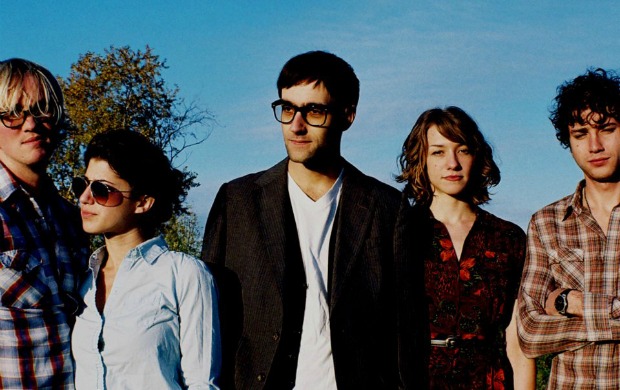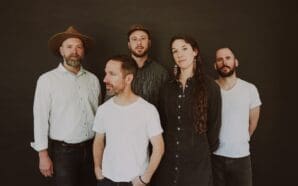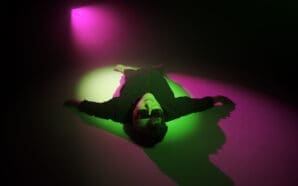There is something profoundly anti-sentimental about Cool Nightmare, the latest EP from Portland’s Radiation City, which dropped earlier this week. The release is, in a lot of ways, centered on a dying piano. This piano spent its golden years in drummer Randy Bemrose’s basement. The sound of the decaying piano is the unsung hero of Cool Nightmare, both when the band is using it for its intended purpose and when they are physically airing their frustrations with the then-barely-functional instrument. In the video for the EP’s first single, “Find it of Use,” the band honors the device in a gloriously postmodern manner by destroying it (They later went on to sell its keys alongside flash drives of the EP on tour.) After interviewing the band, I’m hesitant (and a little intimidated) to attempt to characterize the sound of Cool Nightmare. But, like most contemporary artists whom I would consider “intriguing,” it is equally indebted to the sounds of very specific subcultures of music history and theoretical critiques of our (very “fucked up”) culture.
Izzy Cihak: You hail from PDX (Do people still call it that?), which has been a recent focus of America’s “indieisms” and “hipsterisms,” largely because of Carrie Brownstein and Portlandia. What are your thoughts on the city and how it inspires you? Are you especially big fans of anything currently coming out of Portland, musical or otherwise?
Radiation City: We’re fans of Unknown Mortal Orchestra, STRFKR, Point Juncture WA, Pure Bathing Culture, Aan, Adventures! With Might, Pegasus Dream, the Tomorrow People, and the Trailblazers, among others, all hailing from Portland. I can’t highly recommend the product that last one is putting out this year, but the rest are killing it.
Portland is like Manhattan clam chowder, a lot of different ingredients coming together from disparate places to do the same thing. It’s flavorful, comforting, but turns pretty sucky when it gets too watered down.
God bless Portlandia for having a sense of humor in celebration. God damn them for continuing to draw the creative class here.
We do still call it PDX, as that’s still our airport code. It’s also called Stumptown, Bridgetown, Rip City, Rose City.
IC: What inspired your moniker? Was it your hometown, or some more esoteric or existential concept?
RC: It was the Super Nintendo Game Uniracers. Matt was on a stunt track, and busted a z-flip, flip, roll, tabletop, twist combo and the game was like “Rad City!” This was just a couple days ago in San Luis Obispo, but some stories make more sense told non-linearly.
IC: Do you have any other particularly significant non-musical influences?
RC: James Bond, Len Lye, Jeremy Blake, Steve McQueen, family, friends, the seasons, and the foods that come with them.
IC: You’ve gotten a lot of positive feedback from a few quite significant outlets, such as Elle and Nylon. Do you feel as though there has been any coverage or any critic that characterized or defined your sound in an especially poignant manner?
RC: Sean Moeller wrote a really nice piece for our “Daytrotter Session.” A chimerical little narrative that he weaves in listening to ‘The Things You Tell Us.’ It’s paced very well, lending itself to the slow space in the song, and as such it seems to last a great deal longer than the 400 or so words usually would. There are clear visuals, well-considered metaphors, and above all, an artful dedication to the feel of his piece, and ours. That kind of work is really refreshing to read on so many levels. For one, it’s personal. You see a lot of write-ups these days that are just rehashes of some press release. To see something where the writer has put some critical thought into the art, I find the read way more engaging. For two, it inspires some of that kind of thought in the reader. Instead of trying to condense and compartmentalize with “RIYL’s” or “x-meets-z’s” (both deep wells for instant identification, however shallow the understanding), it opens a new can of worms, begs questions. The reader can relate to one connection, but is forced to make others on their own. And with all the many ways that music can exist for us, I think it’s of vital importance for music writers to encourage these new discoveries in contexts other than market, history, and fact.
IC: You recently had your first SXSW experience. How did that go? Any particular highlights?
RC: SXSW went very well for us. We were wise enough to give ourselves a couple days of rest on both sides of that week so in the thick of it we’d have the resolve to stay hustling. 8 shows in 5 days isn’t terribly hard work, but when you throw in the traffic madness, PR and business obligations, a fashion show and all the shows we wanted to see, it can quickly turn into a grind.
The “green room” for the Portland showcase at the Grackle was a highlight. Their next door neighbor opened his house to all 20 odd bands and let us swim in his pool (which came adorned with his two young rascal daughters and their super cute younger brother that graciously allowed us to launch him into the salt water from the hot tub perch), BBQ on his grill, and lay out on his patio. It was a delightful home away from home, complete with the crowd we’d be hanging with were we in PDX. Another was an invite-only show we played one afternoon in exchange for a couple nights housing. The backyard we played in sat atop a cliff overlooking a lovely little park. There were hawks and grackles hovering on the thermals coming up the hill, a great deal of sunshine, and about a dozen of the sweetest Austin locals you’d ever chance to meet. No PA, no festival madness, just a willing, rapt audience on a super sunny afternoon.
IC: Your first release came out via your cassette-only label, Apes Tapes. In a time when most seem to be more than willing to succumb to “high technology” and even the “rebels” stick solely to vinyl, that seems like a bit of a statement (and a ballsy move). What’s your take on the way that most people currently consume music? I’m still yet to go the whole digital route, myself.
RC: Releasing music on cassette had less to do with having big balls (which is not to say that our balls aren’t big, mind you) and more to do with having a small budget, and a large, ahem, affinity, for the cassette medium. It’s got a lovely, if degenerative, sound quality, is very affordable and reusable. Cassettes also lend themselves to the EP/LP format (not that we have anything against cassingles…) which is something we are huge fans of. Certainly we appreciate songs that stand alone, stick in your ear (Gorillaz “Do Ya Thang” is a very recent example), beg to be on the radio/silver screen/etc. We recognize how one hit can make a career, as well, but we’ve always taken (to use one more of these incessant parenthetical asides, and a last phallic nod while I’m at it) the long view in that regard. We create groups of songs that work together, and for the most part leave the single touting and binary coding to those that have gone the digital route wholeheartedly.
IC: Finally, for the video of “Find it of Use,” you smashed to pieces the piano that you utilized for much of your latest EP. Is there anything else you’d love to smash to pieces… literally or metaphorically?
RC: The 1% piggy bank. Gender inequality. The world’s fossil fuel infrastructure. The Portland Trailblazers? Oh wait, that already happened this season.









